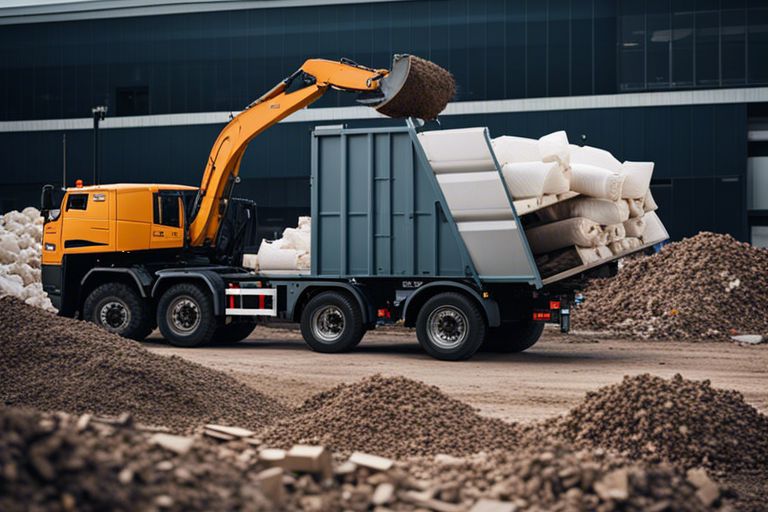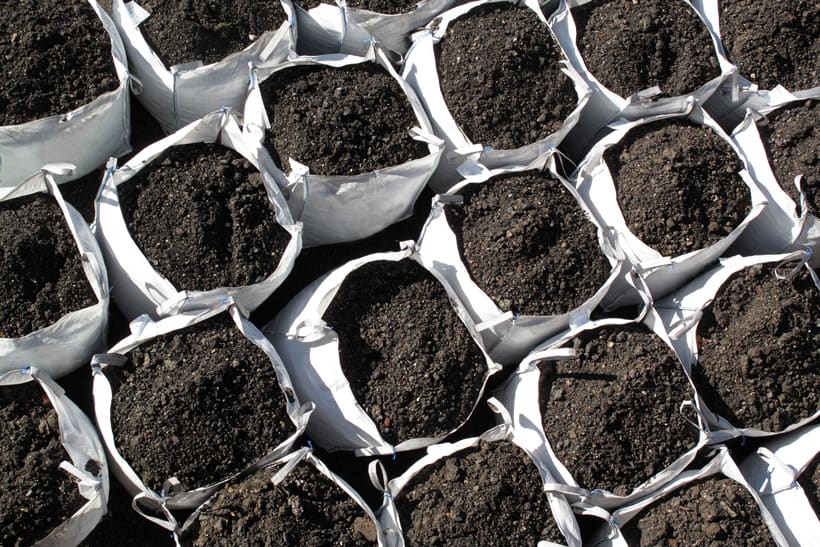Obviate the spread of diseases and promote public health with effective waste removal systems. Waste removal plays a pivotal role in preventing the proliferation of diseases by eliminating breeding grounds for pests and harmful pathogens. Inadequate waste removal poses significant health risks and can lead to outbreaks of diseases such as cholera, dengue fever, and gastrointestinal infections. Proper waste removal not only protects the public from infectious diseases but also contributes to a cleaner and healthier environment. This blog post will explore the critical importance of efficient waste removal in disease control and public health, shedding light on the consequences of neglecting this essential aspect of sanitation.
Key Takeaways:
- Proper waste removal is crucial in preventing the spread of diseases and maintaining public health.
- Improper waste disposal can lead to the breeding of disease-carrying pests such as rodents and insects.
- Regular waste removal and sanitation practices are essential in combating the transmission of infectious diseases within communities.
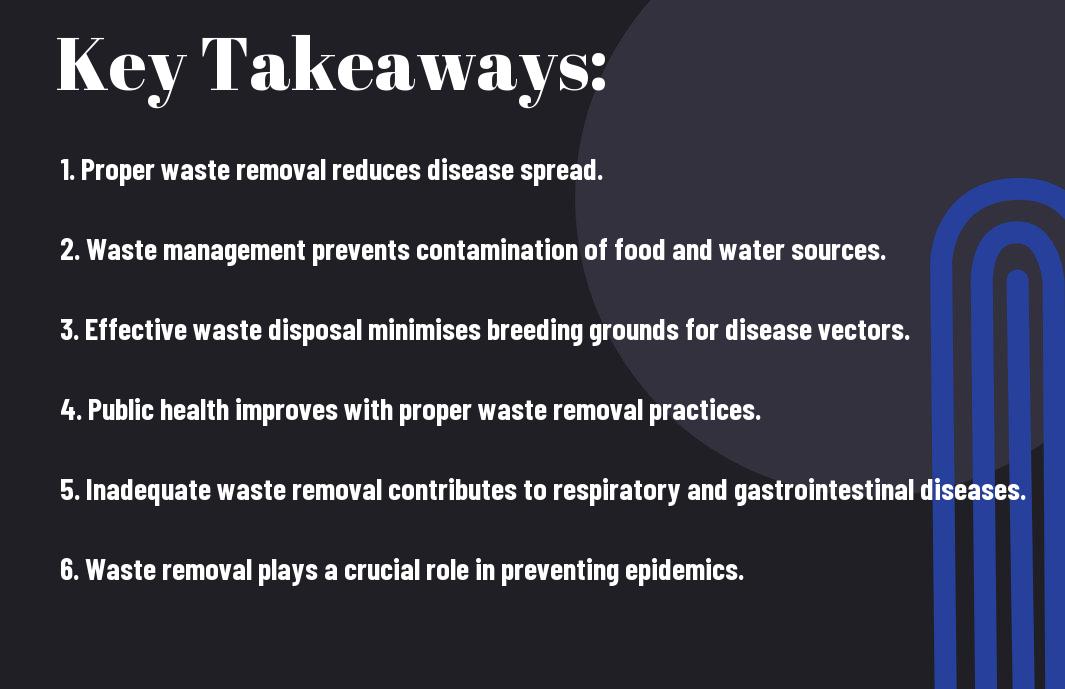
The Science of Waste-Related Disease Transmission
Health Care Waste Management – Public Health Benefits here provides valuable insights into the role of waste management in disease control and public health.
Pathways of Disease Transmission Through Waste
The transmission of diseases through waste occurs through various pathways, including direct contact with contaminated waste, ingestion of contaminated food or water, inhalation of airborne pathogens, and vectors such as rodents and insects. These pathways play a crucial role in the spread of infectious diseases within communities and healthcare facilities.
Types of Waste and Associated Health Risks
Different types of waste present different health risks, with biomedical waste carrying a high risk of transmitting infectious diseases, and hazardous chemicals in industrial waste posing long-term health hazards. This highlights the importance of proper waste management to mitigate these risks and protect public health.
| Waste Type | Associated Health Risks |
| Biomedical Waste | Infectious disease transmission |
| Industrial Waste | Long-term health hazards from hazardous chemicals |
| Household Waste | Exposure to pathogens and toxins |
| Electronic Waste | Risk of heavy metal poisoning |
| Agricultural Waste | Exposure to pesticides and pathogens |
It is vital to recognise the diverse range of health risks associated with different types of waste. Implementing appropriate waste management practices is crucial in preventing the spread of diseases and protecting public health. This information should serve as a reminder of the importance of proper waste disposal and its significant impact on community well-being.
- transmission
- infectious
- health risks
- biomedical waste
- industrial waste
Modern Waste Removal Strategies
In the modern world, waste removal has become an essential part of maintaining public health and preventing the spread of diseases. With the growing urban population and industrial development, the management and treatment of waste have evolved to keep up with the increasing demand. This chapter will explore some of the modern waste removal strategies that play a crucial role in disease control and public health.
Solid Waste Management Policies
Solid waste management policies have been put in place to regulate the collection, transportation, and disposal of solid waste. These policies aim to reduce the environmental impact of waste and minimise the health risks associated with improper waste management practices. By implementing these policies, local authorities can ensure that solid waste is properly managed, which in turn, significantly reduces the risk of disease transmission and environmental pollution.
Advances in Biological and Chemical Waste Treatment
Advances in biological and chemical waste treatment have revolutionised the way we manage waste. Biological waste treatment methods harness the power of microorganisms to break down organic waste, while chemical waste treatment involves the use of various chemical processes to neutralise and detoxify hazardous waste. These advancements have made it possible to treat a wider range of waste materials in a more efficient and environmentally friendly manner.
These modern waste treatment methods are crucial in reducing the amount of hazardous waste that ends up in landfills, minimising the risk of contamination and disease spread. They also contribute to creating a healthier and more sustainable environment for current and future generations.
Challenges and Innovations
Waste removal and management pose a number of challenges for disease control and public health. From inadequate infrastructure to lack of public awareness, there are numerous obstacles that impede effective waste disposal. However, innovative solutions and advanced technologies are being developed to address these challenges and improve waste management practices.
Problems in Developing and Implementing Waste Management
One of the major problems in waste management is the lack of resources and infrastructure in developing countries. Inadequate funding and poor governance often result in haphazard waste disposal, leading to environmental pollution and public health risks. Moreover, the implementation of waste management policies and regulations is often hindered by a lack of public awareness and education regarding the importance of proper waste disposal.
Cutting-edge Technologies in Waste Disposal and Disease Control
In recent years, there have been significant advancements in waste disposal technologies that not only improve waste management but also contribute to disease control. Advanced incineration and landfill technologies help in the safe disposal of medical and hazardous waste, reducing the risk of infectious diseases. Furthermore, innovations such as waste-to-energy conversion and recycling technologies offer sustainable solutions for waste management, reducing the environmental impact and promoting public health.
These cutting-edge technologies play a crucial role in minimising the spread of infectious diseases and improving public health. By providing efficient and environmentally friendly waste disposal methods, they contribute to reducing the risk of contamination and the spread of harmful pathogens. Implementing these innovations is essential in addressing the challenges posed by waste management and ensuring the well-being of communities worldwide.
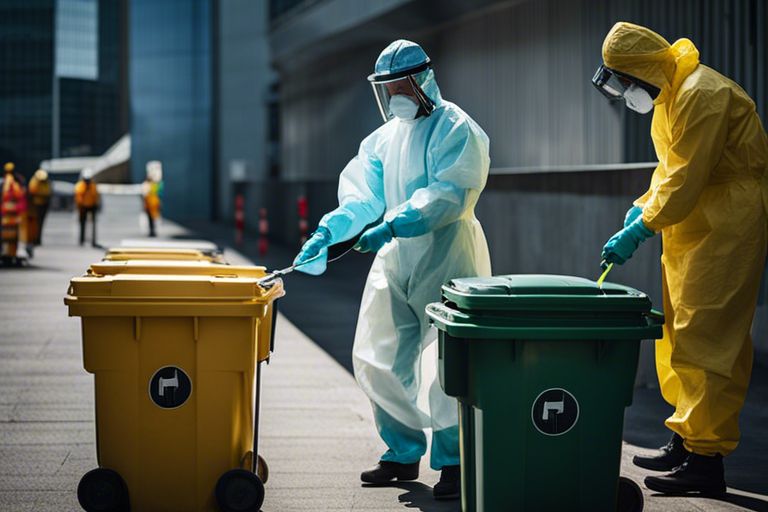
Community Engagement and Education
Community engagement and education play a crucial role in the effective management of waste and the prevention of diseases. By involving the local community in waste removal initiatives and providing education on proper waste handling and disease prevention, we can significantly reduce the risk of public health hazards.
Role of Community in Effective Waste Management
The active involvement of the community in waste management is essential for maintaining a clean and healthy environment. When individuals take responsibility for their waste and participate in recycling and proper disposal practices, it not only reduces the burden on local authorities but also minimises the risk of diseases spreading through contaminated waste. By encouraging community participation in waste management, we can create a positive impact on public health and the environment.
Educational Programs for Disease Prevention and Waste Handling
Educational programs are key to raising awareness about the link between waste handling and disease prevention. By providing information on the potential health risks associated with improper waste disposal and promoting best practices for waste management, we empower individuals to make informed decisions that protect their own health and that of the community. Furthermore, educational initiatives can also promote the adoption of sustainable behaviours, such as reducing waste generation and supporting recycling efforts.
Effective educational programs can cover a wide range of topics, including the proper use of waste containers, separation of recyclable materials, and disposal of hazardous waste. Additionally, they can create awareness about the impact of waste on the spread of diseases, such as the transmission of infectious agents through improper handling of medical and biohazard waste. By equipping individuals with this knowledge, we can encourage them to take a proactive role in disease prevention and waste management, ultimately contributing to a healthier and safer community.
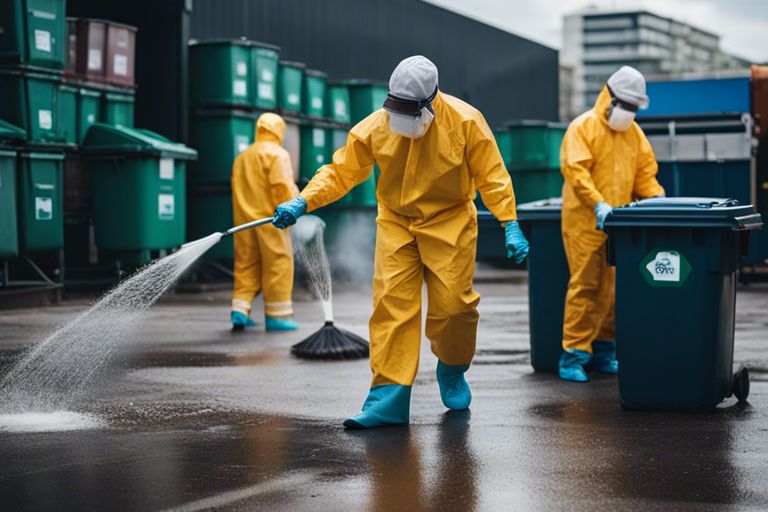
The Role of Waste Removal in Disease Control and Public Health
In conclusion, waste removal plays a critical role in disease control and public health. Proper disposal of waste, whether it be medical, household, or industrial, is essential for preventing the spread of diseases and maintaining a clean and healthy environment. Effective waste removal also reduces the potential breeding grounds for disease-carrying vectors such as rodents, insects, and other pests, thus minimising the risk of disease transmission. In addition, the proper management of waste helps to mitigate pollution and protect the natural environment, further contributing to public health and wellbeing. It is imperative for governments, communities, and individuals to prioritise and invest in efficient waste removal systems in order to safeguard public health and prevent the spread of infectious diseases.
FAQ
Q: Why is waste removal important in disease control and public health?
A: Waste removal is crucial in preventing the spread of diseases as it eliminates breeding grounds for disease-carrying pests and reduces the risk of contamination of food and water sources.
Q: What diseases can be controlled through effective waste removal?
A: Diseases such as cholera, dysentery, and typhoid fever can be controlled by proper waste removal which prevents the spread of pathogens through contaminated waste.
Q: How does waste removal contribute to public health?
A: Proper waste removal reduces the risk of exposure to hazardous materials, toxins, and infectious agents, thereby protecting the community from illness and promoting overall public health.
Q: What are the consequences of inadequate waste removal on public health?
A: Inadequate waste removal can lead to the contamination of air, soil, and water, resulting in the spread of infectious diseases, respiratory disorders, and other health hazards within the community.
Q: What measures can be taken to improve waste removal for disease control?
A: Implementing proper waste management practices, including regular waste collection, recycling initiatives, and community education on waste disposal, can significantly improve disease control and public health outcomes.


